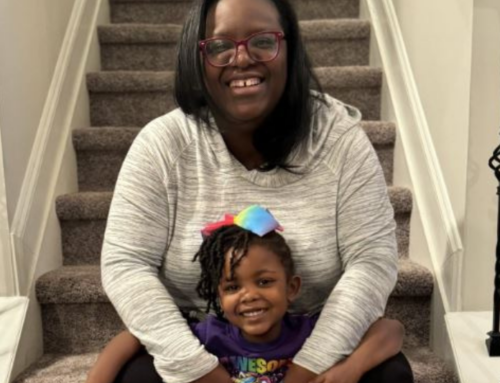By Elizabeth Waetzig and Ghia Kelly
*This article was written as part of CM’s involvement in the Early Childhood Systems Technical Assistance and Coordination Center (ECS-TACC)
Early childhood systems leaders across the country are citing the desire to infuse equity throughout their systems as both a strong goal and a specific challenge in their efforts. This critical work will have a significant impact on a large part of our country that has been historically excluded from services and support. Because that exclusion began before these supports were made available and has persisted over time throughout our systems and structures, achieving true equity requires time, resources, stubborn persistence, and a willingness to see equity work as a long journey that must be taken collectively. It starts with knowing what goals you are working toward and understanding the current and historical context around those affected by exclusionary practices.
What Does Equity Really Mean?
Agencies, organizations, and individuals are increasingly striving to move toward more equitable practices and systems. Throughout the past few decades of health and human services work, we have been focusing on culturally competent services, eliminating disparities, and achieving equity. Many openly say that they are not always sure what that means. In the article entitled “What the Heck Does Equity Mean” in the Stanford Social Innovation Review (2016), the complexity of defining equity is described as follows:
“Understanding equity is somewhat like the proverbial blind men describing the different parts of an elephant they touch but failing to ‘see’ the whole animal. True understanding will come by gathering multiple perspectives. As one program officer at a national foundation so astutely put it, ‘The fact is that we don’t know what equity looks like as a society, because we’ve never actually had it.’”
Truly achieving equity in a system is a very long, reflective, winding process. Every group, organization, or agency is in a different stage in its equity journey. No matter where you are, you need to have a sense of your destination. A collaborative and meaningful definition of equity provides a sense of where you are headed in your equity journey. The process of coming to that definition is as important as the definition itself. In the process of defining equity for the road ahead, consider the following questions:
- Who should be a part of this dialogue?
- What resources, such as time, are you willing to commit to defining equity?
- How will you ultimately decide on the definition (e.g., unanimous, consensus, majority)?
- Are you considering questions and activities that will engage the imagination of the individuals in your group?
- Paint a picture of equity in words or physically paint it.
- How would you experience equity through your five senses? What would it feel, look, taste, smell, or sound like?
- When do things feel inequitable?
- Have you explored other definitions that are out there (e.g., see below for examples)?
- What pieces of definitions feel right?
- What is close, but not enough?
Existing sample definitions:
HRSA: Health Equity is the absence of disparities or avoidable differences among socioeconomic and demographic groups or geographical areas in health status and health outcomes such as disease, disability, or mortality.
World Health Organization: The absence of avoidable or remediable differences among groups of people, whether those groups are defined socially, economically, demographically, or geographically.
Change Matrix: Equity is when everyone, regardless of who they are or where they come from, has the opportunity to thrive. Equity requires acknowledging root causes of inequities, eliminating barriers, lifting community strengths, and relentlessly pursuing justice.
National Association for the Education of Young Children: Equity – The state that would be achieved if individuals fared the same way in society regardless of race, gender, class, language, disability, or any other social or cultural characteristic. In practice, equity means all children and families receive necessary supports in a timely fashion so they can develop their full intellectual, social, and physical potential.
Merriam Webster: Fairness or justice in the way people are treated
Get Proximate
To advance equity, organizations and agencies must be willing to get proximate to the problem(s) they seek to address. Disaggregating qualitative data is a great way to identify disparities at the state and local levels, but this information must be coupled with the lived experiences of those most impacted by the inequities to truly understand what the numbers mean. Story circles, focus groups, interviews, and surveys are a few of the ways that families and communities can be engaged in the data-gathering process.
Families and communities appreciate being given the opportunity to provide insight and help to inform the work of organizations and agencies in their community. The mantra of many community organizers and activists is “Nothing About Us Without Us,” which reveals their desire for engagement and inclusion. The engagement of families and communities by organizations and agencies is not only a best practice but a key strategy toward achieving equity.
Below are a few questions that organizations and agencies might consider when embarking on their equity journey:
- Who lives in your state?
- What early childhood data would you need to identify disparities and where does this data live?
- Which population groups experience the greatest disparities and inequities related to maternal and child health?
- Who provides maternal and child health services in your state?
- What have been the experiences of families in accessing these services? What would they say about the appropriateness of the services?
- How will you gather this information from families?
- How will you use this information to inform your work?
- How will you meaningfully engage families and communities in your journey toward equity?
Resources:
What the Heck Does ‘Equity’ Mean?
Why Am I Always Being Researched?
Manifesto for Race Equity and Parent Leadership in Early Childhood Systems
Racial Equity Toolkit: An Opportunity to Operationalize Equity




